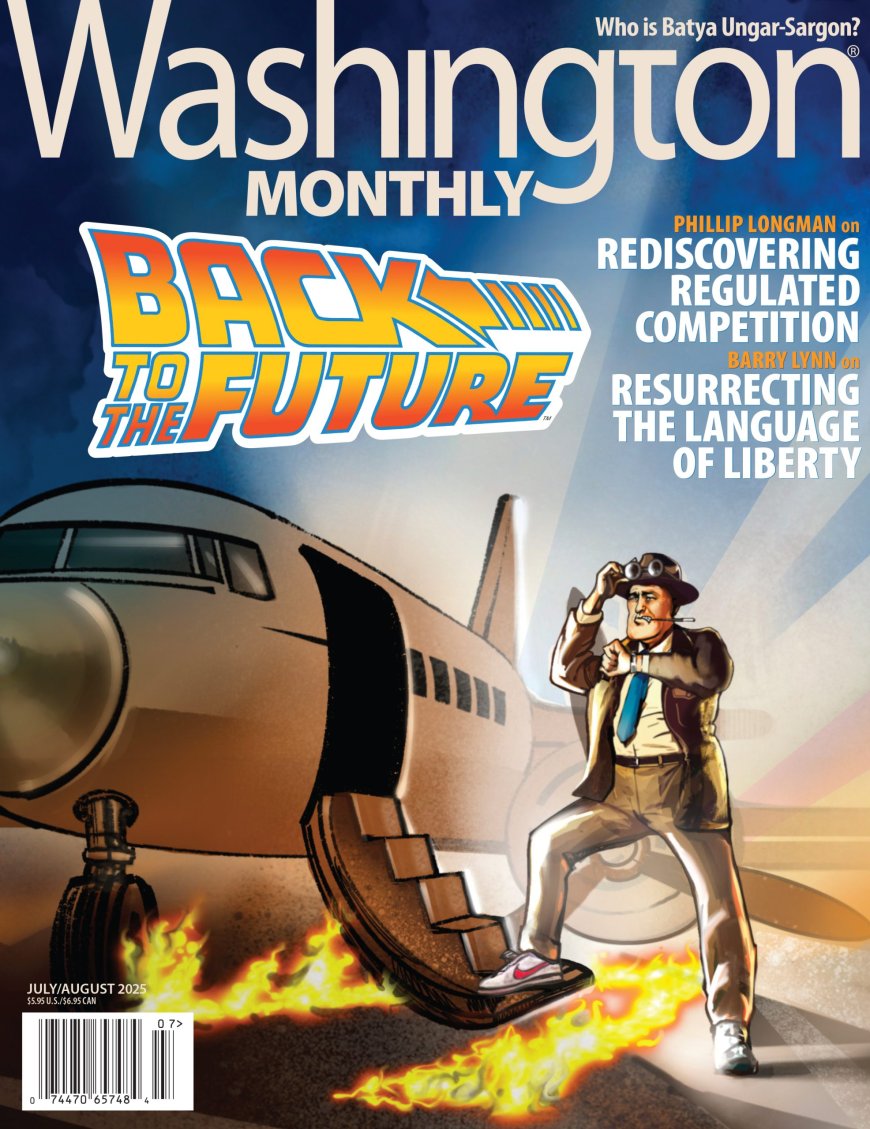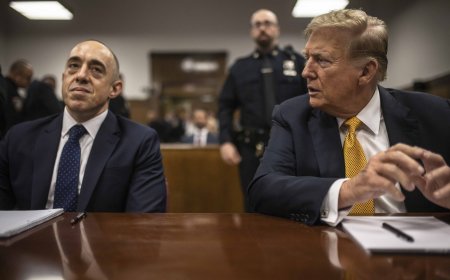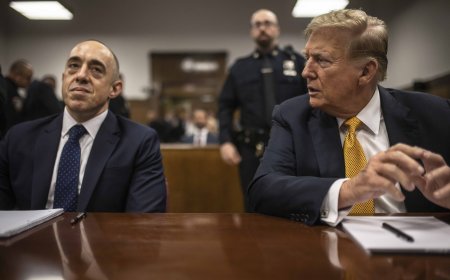Rules to Win By


Democrats are putting a lot of their political chips on the message that Donald Trump’s radical tariff regime will raise consumer prices, tank the economy, and alienate voters. So far, that’s looking like a pretty good wager. But it’s also a risky one. If Trump continues to ease and modify his tariff policies, it’s possible that the economy won’t fall into recession and inflation won’t be at intolerable levels by the time the 2026 midterms roll around. It’s even conceivable that by November 2028, enough manufacturing will have been reshored (whether because of tariffs or not) that Trump and his designated successor—presuming there is one—will be able to declare victory.
Even if that scenario seems unlikely, there is an aspect to Trump’s tariff pitch that Democrats ignore at their peril: It addresses a deep yearning among middle- and working-class Americans, especially those living outside large metro areas. For decades, these folks have watched their communities fall further and further into economic and civic decline, even as big coastal cities have boomed. It’s hard to exaggerate their fury at this inequity, their desperation to reverse it, and their gratitude to Trump for, in their eyes, at least trying to do something about it. These are precisely the voters the Democratic Party keeps losing and most needs to win back. And right now, Democrats don’t have a convincing alternative economic vision to Trump’s.
Arguably, they did. It was called Bidenomics. It consisted of massive fiscal stimulus, aggressive antitrust enforcement, and an industrial policy of targeted tariffs and federal support for key industries such as alternative energy and microchips, much of it going to red states and districts. I could make the case—and have in these pages—that this agenda was quite successful (the reshoring Trump promises was already happening under Biden). But in 2024, enough voters disagreed that we now have President Trump. Part of the reason was that voters felt more punished by inflation than helped by the policies. Part of it was that Biden was too old to run, much less to articulate his economic agenda. But it was also because Bidenomics was a half-thought-through hodgepodge of policies and programs that, while connected, lacked a unifying theory—or at any rate one that even the most eloquent younger members of his administration, like Jake Sullivan and Pete Buttigieg, could explain in under half an hour.
The advantage of Trump’s agenda is its simplicity: A single policy—high tariffs—will solve all our problems. Tariffs will punish the countries that stole our jobs, bring those jobs back to America, and raise enough revenue to pay for massive tax cuts. The disadvantage of Trump’s agenda is that it is simplistic, as even his own base understands. Nearly two-thirds of Republicans believe that Trump’s tariffs will raise prices for consumer goods, according to an April Gallup poll, and 25 percent oppose them.
What Democrats need is a vision for reviving the American dream that is more convincing than Trump’s, but more robust and understandable than Biden’s. In this issue of the Washington Monthly, senior editor Phillip Longman offers one: regulated competition. The term was coined by the political scientist and economic historian Gerald Berk to describe the sophisticated set of federal market rules that steered the course of the nation’s economy from the late 19th century to the 1970s, before it was dismantled in the era of deregulation. These rules set the terms of competition in much of the economy, from banking to transportation to energy. “Working with industry,” writes Longman, “federal lawmakers and regulators hashed out rules that determined who could enter and exit different key sectors, what terms of service they could impose, and with whom they could merge.”
To modern ears trained in the language of libertarianism, this sounds benighted. But it was precisely the system that built the United States into a capitalist superpower while delivering broad-based prosperity. It did so, Longman explains, by catalyzing a virtuous cycle of innovation:
Firms in key industry sectors like transportation and electricity were guaranteed modest but predictable profits that allowed them to attract more capital, and to take greater risks, than they otherwise could. In exchange, companies were obliged to serve all market segments, rather than cherry-pick the most profitable. This enabled smaller cities, towns, and rural areas to compete on a more equal footing with large cities on the coasts, thus spreading economic development and wealth creation more equitably across the country while also serving as a check on the growth of financiers and oligarchy.
With the Trump administration and the Supreme Court decimating regulatory agencies, and “abundance liberals” blaming excessive red tape for many of the nation’s ills, the idea that Democrats should rally around an agenda of economic reregulation might sound crazy. Yet a decade ago, almost no one (aside from Washington Monthly writers) was talking about reviving antitrust enforcement. Now it has a foothold in both parties. And tariffs were considered retrograde. Now they’re the pillar of American economic policy. As Barry Lynn explains elsewhere in this issue, Democrats stand to reap a political windfall if they can learn to connect policies like these to language that speaks to the American working class’s hunger for economic liberty. There’s no reason why regulated competition (or whatever the political messaging pros decide to call it) can’t go from the forgotten secret of America’s past economic success to the blueprint for its future prosperity.
—Paul Glastris, Editor-in-Chief
Inside the issue:
COVER:
The Secret to Reindustrializing America Is Not Tax Cuts and Tariffs. It’s Regulated Competition
From airlines to energy, shipbuilding to railroads, America became a capitalist superpower in the 20th century based on careful market rules. It can do so again.
by Phillip Longman
Resurrecting the Rebel Alliance
To end the age of Trump, Democrats must relearn the language and levers of power.
by Barry Lynn
ON POLITICAL BOOKS:
God and Man at Sea
William F. Buckley spent a lifetime trying to make a coherent intellectual case for conservatism but could never articulate what it was supposed to consist of apart from owning the libs.
by Jacob Heilbrunn
What Hungary Lost When It Obeyed in Advance
The country’s leaders thought they could restore the nation’s lost glory through alliance with Hitler. By 1945, Budapest lay in ruins and 550,000 Hungarian Jews were dead.
by Christian Caryl
The Supreme Court’s Immunity-to-Impunity Pipeline
Grievance dressed as law, history warped into license, today’s Court is not checking Trump’s authoritarianism—it’s codifying it.
by George Thomas
Clever the Twain Shall Meet
An epic new biography of Samuel Clemens confirms the Missourian’s literary mastery but contends that the most important character he ever created was his own.
by Sara Bhatia
FEATURES:
Donald Trump Is Following the Sam Brownback Playbook
The former Kansas governor’s radical economic agenda undermined the state’s prosperity, decimated vital government services, tanked his popularity, and put a Democrat in power. Could the same fate await the current president?
by Nate Weisberg
How Reproductive Freedom Advocates Outsmarted the Anti-Abortion Movement
Since the reversal of Roe v. Wade, the number of abortions is up because of telehealth and the free sharing of mifepristone and misoprostol.
by Carrie N. Baker
Unscrambling the Price of Eggs
Yes, bird flu is a factor, but so is greedflation.
by Claire Kelloway
Who Is Batya Ungar-Sargon?
A Berkeley-educated leftist who couldn’t bear drinking at a bar with Trump voters is now MAGA’s top defender. A tale for our times.
by Nate Weisberg
The Next Frontier of Plutocracy
A little-noticed FEC ruling has opened the door for mega-donors to give nearly unlimited amounts of money directly to political campaigns. Elections will never be the same.
by Bill Scher
Lebanon’s Precarious Future
The collapse of Hezbollah’s dominance has left a power vacuum in Lebanon—and a rare opening to reimagine the state. But without reform, aid, disarmament, and a rethinking of the centralized system of governance, the country risks falling back into the abyss.
by Hicham Bou Nassif
In Defense of Everything-Bagel Liberalism
Critics warned that the Biden administration put so many conditions on the grants it offered to semiconductor manufacturers that the centerpiece of its industrial policy would fail. Those conditions turned out to be key to the program’s success.
by Joel Dodge
The post Rules to Win By appeared first on Washington Monthly.











































